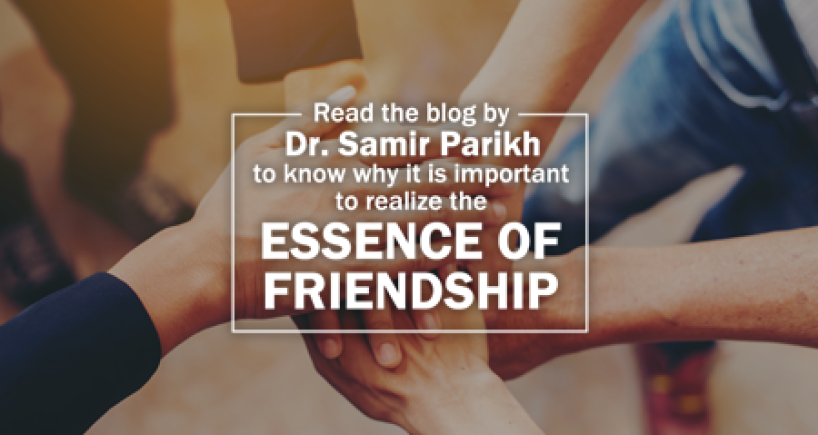
Friendship Day

In today’s fast paced world, realizing the role played by friendship assumes greater significance. All humans are social beings, who need to be able to interact and socialize with others in order to maintain their mental health. Imagine being shut up in a room all alone, without any access to any form of media or communication with the outer world… most of us wouldn’t be able to survive a week! Our friends play an irreplaceable role throughout our lives, and this is important for individuals of all age groups. In fact, it is not only children and adolescents for whom the development of friendships is important, but forming interpersonal relationships has an equivalent significance during adulthood as well. Furthermore, there is a greater need for such a strong support system to be available for the older adults, who are especially more vulnerable to the experience of loneliness.
The Functions of Friendship
The functions of friendships are multifold throughout the various stages of life. Initially, it is through the establishment of friendships that a child gains exposure to the surrounding world, beyond interactions with the primary agents of parents and family members, learns to share, and begins to understand the importance of looking beyond an egocentric perspective. With the progressing years, the peers and friends begin to serve as a major source of influence in the individual’s life, forming the basis of their identity formation and often surpassing the importance attached to parents and families. In fact, teenagers are known to give paramount importance to their peers to the neglect of all others, and as such rely most on their friendships. And with progressing years, as an individual tends to get caught up within the web of building a family or career, it is the friendships that the individual has built in his or her previous years, or is continuing to make, which provide solace from this monotonous life. Besides serving as an outlet for leisure and socialization, it is these friendships that ensure the individual has a support system outside of the family to rely on, to share one’s thoughts and feelings openly, and to seek enjoyment.
Such a network of friendship not only serves as an in-group for the member, who feels a sense of belongingness and connect, but friendship is one of the first arenas of socialization in which one can have a choice or preference for a friend over another. While this preference could be based on proximity, attraction, curiosity, or simply common interests, this is within the person’s control, and hence such a relationship brings with it many potential implications towards the future as well.
Role of Media and Technology
With the rapidly growing technological invasion that the past decade has been witnessing, the importance of the establishment and sustenance of such strong friendships needs to be reiterated. It has become one of the commonest incident for friends, colleagues or family members to be sitting together, but instead of interacting amongst themselves, their minds would be occupied in texting on their phones. In fact, the role of the social media has expanded to such a large extent, that contrary to its apparent intent of improving accessibility and communication, it has led to an ironical alienation and isolation. This is more so due to the greater importance and value being attached to popularity and interactions on social platforms, rather than moving away from this virtual world and coming back to reality. In fact, it is becoming increasingly common to come across children as well as adults experiencing discomfort in face-to-face interactions, as compared to the safer and easier options available to them through the social media.
Need of Establishing Social Support
It is a more than obvious fact that without an adequate social support system, an individual is likely to feel lonely. Though loneliness is very prevalent during the phase of old age, there inevitably comes a time in almost all of our lives when we find ourselves alone, and longing for the company of others. While parents might feel lonely in their old age, a widow might feel lonely after the demise of her husband, a child who has been teased in schools might feel isolated, loneliness could be after a breakup or within a marriage, or someone might even feel lonely when being single in the midst of friends who all are with their girl/boyfriends. In fact, it wouldn’t be surprising if a youngster today felt lonely because he/she had lesser number of friends on a social networking site in comparison to his/her more popular peers!
Therefore, the need for a strong network of social support cannot be reiterated enough. And such a support need not be restricted to your childhood, school or college friends. Establishing friendships can actually be considered a life-long process, as you interact with a variety of individuals within your lifetime, and explore the opportunities to establish relationships with them. You could find a friend in your cousin, colleague, life partner, or even your partner’s friends! There is no end to the circle of networks available to you. However, equally important is to keep in mind the establishment of clear and strong boundaries for all your relationships, in order to prevent a violation of both your own as well as others’ need of privacy, and to ensure the establishment of healthy, mutually reciprocal and stable relationships.
Categories
Clear allMeet the doctor

- Mental Health and Behavioural Sciences | Mental Health and Behavioural Sciences | Psychiatry | Clinical Psychology
-
21 Years
-
900



















